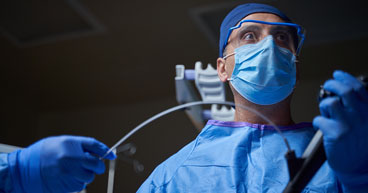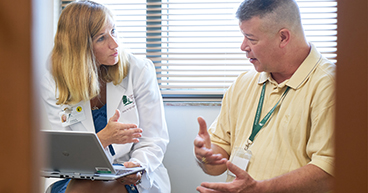
Around 4 percent of Americans will be diagnosed with colorectal cancer during their lifetime, according to the National Cancer Institute. While colorectal cancer rates have declined over the last decade, new diagnoses have increased among younger people. So, it is essential to get screened for the disease regularly, according to Pankaj Vashi, MD, AGAF, FASPEN., a gastrointestinal cancer expert at City of Hope® Cancer Center Chicago.
“The recommended age for an average risk person to start colonoscopy screenings is now 45. If the results are normal, it should be repeated every 10 years,” Dr. Vashi says, adding that those at higher risk of colorectal cancer —including patients with a family history of the disease, certain genetic disorders or inflammatory bowel disease—may need to screen from an earlier age.
“Most patients do not recall any discomfort during the procedure,” says Dr. Vashi. “But good bowel prep is essential prior to undergoing colonoscopy.”
This article covers the basics on how to make preparing for a colonoscopy as stress-free as possible, including:
- Colonoscopy prep: The basics
- How many hours before a colonoscopy should you stop eating?
- Health issues that can affect bowel prep
- Tips for consuming the laxative drink
- Stress-reduction strategies during bowel prep
If you’ve been diagnosed with cancer and are interested in a second opinion on your diagnosis and treatment plan, call us or chat online with a member of our team.
Colonoscopy prep: The basics
During a colonoscopy, a doctor inserts a long, narrow tube with a light and camera at the end into the lower intestine through the rectum. This allows the doctor to examine the lining of the rectum and colon for any signs of cancer or precancerous cells or growths, called polyps.
When you schedule a colonoscopy, your doctor will likely give you instructions on how and what to eat and drink in the days beforehand. This bowel prep diet helps ensure your colon is free of stool, so that your doctor may examine you accurately and fully.
A bowel prep diet often involves:
- Skipping high-fiber foods like nuts, whole grains and raw vegetables, which are harder to pass out of the body
- Avoiding red or purple foods and beverages, which can leave spots on the colon that may look like blood
- Sticking to simple drinks in the days beforehand, such as sports drinks, pulp-free juices and Jello
- Drinking only clear liquids for a day or so before the procedure
Dr. Vashi recommends that patients check their stool during the bowel prep stage.
“If the colon is not cleaned out, the examination could be suboptimal, and we could miss small polyps,” he explains. “At the end of bowel prep, the stool should not contain any fecal material. This is an indication that the patient is ready for the procedure.”
How many hours before a colonoscopy should you stop eating?
According to Dr. Vashi, “typically, a patient is asked to drink only clear liquids for 24 hours before a colonoscopy.”
A clear-liquid diet helps ensure that doctors get the clearest picture of what is happening in the colon during your procedure.
Patients should also fast for at least 8 hours prior to their colonoscopy or, if they have been on a clear-liquid diet, for up to 4 hours.
“Fasting helps prevent nausea and vomiting during anesthesia, both of which can lead to aspiration and lung infection,” Dr. Vashi explains.
Health issues that can affect bowel prep
Some health conditions or concerns may make colonoscopy prep harder. These include:
- Being diabetic
- Having had pelvic or gastrointestinal surgery in the past
- Having dementia
- Recovering from a stroke
- Certain heart health issues, including extremely high blood pressure or congestive heart failure
- Some gastrointestinal conditions, like inflammatory bowel disease
Patients with any of these issues should talk to their doctors, who may recommend a different bowel prep method or medications that can help make bowel prep as safe and effective as possible.
Tips for consuming the laxative drink
Your doctor may also recommend an over the counter or prescription laxative product to help clear out the colon curing bowel prep, such as MiraLAX or Dulcolax. Many include either polyethylene glycol or magnesium citrate.
“There are many newer commercially available products that are much more palatable than they used to be,” says Dr. Vashi. “The majority are in liquid form, but there are some patients who prefer taking tablets due to intolerance to large volumes of liquid.”
Dr. Vashi also offers some tips to make the laxative medication a little easier to drink:
- Mix the medication with a sports drink such as Gatorade
- Alternate taking your medication with sips of clear liquids
- Use a straw or chill the drink mixture beforehand
- Ask your doctor if you can split the medication dose in two—research shows that it leads to better colonoscopy results
Stress-reduction strategies during bowel prep
For many people, preparing for a colonoscopy may be more daunting than the procedure itself. It’s important to find ways to make the bowel prep stage as stress-free as possible. Consider some of the following options to reduce stress in the days before:
- Start to eat smaller meals that are lower in fiber
- If you have any constipation, take a small dose of laxative medication in the week beforehand
- Stay at home the day prior to your procedure
- Create a relaxing environment to minimize anxiety and stress
With good colonoscopy prep, the procedure itself should go smoothly.
“Colonoscopy is a very well-tolerated procedure, especially when it is performed with a short-acting anesthetic agent, and Most patients do not recall any discomfort during the procedure,” says Dr. Vashi.
If you’ve been diagnosed with cancer and are interested in a second opinion on your diagnosis and treatment plan, call us or chat online with a member of our team.


